“Did you know that enrollment in Catholic higher education globally grew three-fold between 1980 and 2020 — from about 2.2 million to 6.6 million students?”
That surge reflects not only a renewed interest in faith-grounded formation, but also a growing appetite for flexibility in how and where that formation takes place. As more learners juggle work, family, parish commitments, or even geographic barriers, online Catholic degree programs are becoming ever more relevant. But is an online Catholic university right for you?
In this post, we’ll unpack the pros and cons, key considerations, and practical tips for discerning whether pursuing a Catholic degree in an online format is a wise choice for your spiritual, academic, and professional goals.
The appeal of an online Catholic degree
Why the trend is accelerating
Several factors are driving the rise of online Catholic education:
- Flexibility for busy adults: Many prospective students are working professionals, parents, or parish ministers who need schedules that adapt to their lives rather than the other way around.
- Broader reach: Online models allow Catholic institutions to extend formation and academic programs to students across dioceses, states, or countries rather than being tied to a physical campus.
- Mission continuity: Some Catholic universities are integrating online offerings into their core identity. For example, The Catholic University of America now offers fully online programs in theology, management, nursing, and social work, alongside blended formats.
- Institutional resilience: As higher education navigates demographic shifts and financial pressures, offering online programs helps institutions diversify their portfolios and reach new markets.
Thus, when you weigh the numbers with the mission, opting for an online Catholic degree can allow you to pursue academic growth without sacrificing your faith formation or flexibility.
What to look for in an online Catholic university
Choosing an institution for your Catholic degree is not just a matter of checking boxes — it’s about ensuring alignment between your faith journey and academic goals. Here are key factors to evaluate:
- Authentic Catholic identity and oversight
A strong online Catholic university should maintain fidelity to Catholic teaching, have ecclesiastical oversight or approval (e.g. by bishops or a Catholic board), and integrate the Catholic intellectual tradition into its curriculum. - Accreditation and academic rigor
Ensure the institution is regionally or nationally accredited and that its programs meet academic standards in your discipline of interest. - Formation components
Look for courses or modules in theology, philosophy, ethics, or Catholic social teaching as part of or complementary to your major. These help sustain and deepen your faith while pursuing professional goals. - Student support, community, and spiritual resources
Even online, you’ll want access to scholarly advising, peer interaction, spiritual direction, virtual chaplaincy, online Mass or prayer, and opportunities for retreats or local chapter gatherings. - Flexibility in scheduling and pacing
Fully asynchronous courses, hybrid models, or summer residencies can allow you to balance personal, work, or ministry demands. - Cost, financial aid, and value
Calculate total cost (tuition, fees, materials) and explore scholarship or diocesan support. Compare with on-campus or hybrid options. - Reputation and alumni outcomes
Check graduation rates, alumni job placement, and network strength among graduates of the institution’s Catholic degree programs.
Pros & cons: What you gain — and what to watch out for
Advantages
- Flexibility in time and location — You can study from wherever you are, often on your own schedule.
- Continuity of vocation and ministry — You don’t have to pause your parish, family, or work commitments to pursue your formation.
- Access to specialized Catholic programs — For example, theology, catechetics, canon law, or pastoral ministry that might not be locally available.
- Potential cost efficiencies — Reduced commuting, housing, and campus fees can make some online programs more affordable.
- Global or cross-diocesan community — You may interact with peers from diverse cultures yet shared faith.
Challenges & trade-offs
- Less in-person community life — The richness of campus liturgies, sacramental life, and spontaneous encounters is harder to replicate online.
- Self-discipline required — Without the structure of face-to-face class meeting times, it’s easier to procrastinate or fall behind.
- Technology and access barriers — You’ll need reliable internet, hardware, and comfort with digital learning platforms.
- Risk of “thin” formation — If the institution treats faith formation as an add-on, rather than integrated into all learning, you may lose depth.
- Residency or onsite requirements — Some Catholic degree programs demand occasional campus visits or summer intensives, which may complicate logistics.
How to assess whether an online Catholic degree suits you
Here’s a practical checklist to help discern:
- What is your motivation? (Career advancement, deeper theological competence, parish work, etc.)
- What is your current schedule and obligations? Will classes at set times or fixed deadlines interfere with your life?
- How strong are your self-motivation and time management skills?
- What kind of spiritual life and community do you already have (or need)? Can you sustain that in a partially virtual environment?
- Does the online Catholic university you’re considering offer formation, liturgy, spiritual direction, and peer connection in meaningful ways?
- Can you commit to whatever residency or immersion components the program requires?
- How does the total cost and financial support compare to in-person or hybrid options?
If your answers lean toward flexibility, independence, and a primary concern for integrating faith and learning, then an online Catholic degree may be an excellent fit.
Tips for succeeding in an online Catholic degree program
- Set a weekly rhythm: Build study blocks into your calendar as firmly as work or Mass.
- Engage spiritually: Use each course as a doorway to prayer, reflection, or community discussion.
- Seek accountability: Form or join virtual study groups, faith circles, or peer accountability partners.
- Communicate with instructors: Many Catholic faculty are willing to mentor, direct, or engage with you beyond assignments.
- Create local touchpoints: Even if your program is online, connect with parish, diocesan, or regional groups for sacraments, retreats, and fellowship.
- Track progress and formation goals: Reflect periodically on how the degree is shaping your faith, character, and vocation, not just your résumé.
Final thoughts
Is an online Catholic degree right for you? If you seek formation that is faithful, flexible, and integrated with your vocation, then it certainly can be. The trick is to choose a university that doesn’t merely offer a degree with the word “Catholic” in the title—but deeply embeds Catholic identity, formation, and community into every class, discussion, and assignment.

